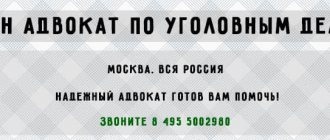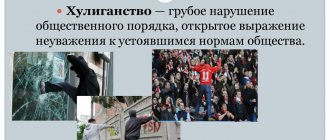The activities of media workers are protected by law. However, only one single article of the Criminal Code of the Russian Federation is aimed at this - 144 “on obstructing the legitimate professional activities of journalists.” Today we will analyze it in detail: we will talk about the problems of qualifying the offense, explain what exactly is meant by obstruction of journalistic work, and also give an example from judicial practices in similar cases.
Multi-channel free hotline Legal advice on criminal law. Every day from 9.00 to 21.00
Moscow and region: +7 (495) 662-44-36
St. Petersburg: +7 (812) 449-43-40
What is obstructing reporters under the law?
Article No. 29 of the Constitution of the Russian Federation states that every citizen is granted the right to collect, receive, transmit, produce and disseminate various information by any available method within the framework of the law, not counting information that is regarded as a state secret. Citizens also have a constitutional right to freedom of media.
This freedom can be realized in various ways:
- by means of a letter;
- using spoken language;
- through the media;
- using other legal methods.
The most popular way to implement the rights enshrined in Article 29 of the main document of the state is the media.
Obstruction of the normal work of the press is very common and affects both newspaper workers and television and radio broadcasters.
Thus, the freedom of speech of reporters can be infringed in the following ways:
- Installation of censorship.
- Carrying out the termination of the work of the media by illegal means.
- Intrusion into work and interference with the professional independence of editorial staff.
- Forcing a press representative to disseminate or refuse to disseminate any information.
Despite the fact that the creation of interference with the media in the implementation of their direct work is considered in Criminal and Administrative legal norms, only Article 144 of the Criminal Code of the Russian Federation provides for criminal liability for infringement of the free activities of the media.
Art. 144 of the Criminal Code of the Russian Federation consists of three parts, each of which determines the punishment for a person who has committed an illegal act against journalists, depending on the aggravating circumstances.
According to this article, people who interfere with the activities of the press are subject to criminal prosecution only by forcing them to disseminate a specific type of information or by refusing to disseminate it.
In other cases, for example, when there is interference in collecting material, criminal liability is not provided. And this is a big flaw in the law, because often it is when trying to collect information that media workers suffer.
In this regard, legal colleges are increasingly raising the question that the article requires amendments. If there is a new edition, it should provide for punishment for persons who obstruct journalists in the process of collecting and processing data.
Legal basis of journalistic activityAs one of the social institutions of society, journalism exists in accordance with the laws of this society, which regulate not only the level of freedom of journalistic activity, but also its other aspects. Every journalist must know his rights and obligations established by law.
For Russian journalism, the norms of the Constitution of the Russian Federation are fundamental .
This is the basic law of our state, on the basis of which other legislative acts - codes and laws - are developed and adopted.
Until June 12, 1990, in our country there was no legal act at all that would regulate the activities of the media - the procedure for creating newspapers and magazines, the appointment of editors-in-chief and other issues of journalistic activity were regulated by the normative documents of the CPSU. With the adoption of the Law “On the Press and Other Mass Media,” a legal act finally appeared in the USSR that defines many issues regarding the functioning of the media. But after a year and a half, a law of the Russian Federation appeared, which is currently decisive for the activities of Russian journalism.
Federal Law “On the Mass Media”
was adopted in December 1991 (later various changes were made to the Law; in the fall of 2008, the faction of the United Russia party in the State Duma of the Russian Federation began work on a new version of this Law). The law prescribes the procedure for organizing the activities of the media, the dissemination of mass information, the relations of the media with citizens and organizations, the rights and responsibilities of a journalist, the responsibility of journalists and the media for violating legislation on the media.
The Law establishes the procedure for establishing a mass media outlet, as well as obtaining a license for television and radio broadcasting. In Art. 8 of the Law determines that “the editorial office of a mass media carries out its activities after its registration.” An application for mass media registration is submitted to the Federal Service for Supervision in the Sphere of Communications, Information Technologies and Mass Communications (Rossvyazkomnadzor) or its territorial bodies. Only a document certifying payment of the state fee is attached to the application. At the same time, the Law prohibits the presentation of other requirements when registering media (although, we note, this often happens).
Exempt from registration are media outlets established by state authorities and local self-government bodies exclusively for the publication of their official materials, periodicals with a circulation of less than 1 thousand copies, radio and television programs distributed via cable networks within one enterprise or institution, or having no more than 10 subscribers, as well as audio and video programs distributed in recordings in a circulation of no more than 10 copies. After registration, no later than three months after the first publication or broadcast of this mass media, the editorial charter must be sent to the territorial body of Rossvyazkomnadzor, which is adopted at a general meeting of journalists on the editorial staff and approved by the founder of the mass media. The editorial charter defines the rights and responsibilities of the founder, editorial board and editor-in-chief, the procedure for appointing the editor-in-chief and a number of other issues of the editorial office. If the editorial office employs less than 10 people, then the charter can be replaced by an agreement between the founder and the editor-in-chief or editorial board.
The activities of a media outlet can be terminated or suspended only by decision of the founder or by a court decision at the request of the Rossvyazkomnadzor body.
The Law “On Mass Media” prohibits the establishment of television companies by foreign legal entities and individuals, Russian legal entities whose foreign participation in the authorized capital is more than 50%, as well as by Russian citizens with dual citizenship. By the way, such and even more stringent restrictions on the establishment of mass media are in effect in many countries around the world. Thus, in the USA, Spain, Greece, Ukraine, Thailand, the share of foreign capital in television and radio companies cannot exceed 25%; in Austria, Canada, France and Japan, the participation of foreign investors in television and radio broadcasting companies is limited to 20%.
Television and radio companies must also obtain broadcasting licenses, which are issued by the Federal Service for Supervision of Communications, Information Technologies and Mass Communications. At the same time, licenses for the right to broadcast in settlements with a population of more than 200 thousand inhabitants are issued only based on the results of a competition.
The Law “On the Mass Media” also defines the responsibility of media editorial offices and journalists for publishing information that does not correspond to reality (this is also stated in Article 152 of the Civil Code of the Russian Federation). According to the Chairman of the Union of Journalists of Russia Vsevolod Bogdanov, in our country the courts annually consider about 3.5 thousand lawsuits against journalists for the protection of honor and dignity[34]. Most often, such claims are filed by officials, businessmen and deputies. For example, the leader of the LDPR, Vladimir Zhirinovsky, once simultaneously filed more than a hundred lawsuits against journalists[35], and the mayor of Vladivostok, Viktor Cherepkov, once simultaneously filed almost 90 lawsuits against the newspaper Vladivostok and its journalists.
At the same time, courts do not always make objective decisions based on the law. Thus, in 1993, the Frunzensky District Court of Vladivostok declared a quotation from M. Saltykov-Shchedrin’s fairy tale “The History of a City,” published in the Vladivostok newspaper, to be untrue and causing moral damage to the mayor of the city, Viktor Cherepkov. The decision of the district court was confirmed by the cassation board of the Primorsky Regional Court, and only the presidium of the regional court exempted the editorial office of the newspaper and the great Russian writer from punishment.
Often, such claims end in court decisions, according to which media editors not only publish refutations of untrue information, but also pay significant amounts of money to the victims. Thus, in accordance with the decision of the Arbitration Court of St. Petersburg adopted in February 2008, Kommersant CJSC must pay the North-Western Academy of Public Administration under the President of the Russian Federation 3.5 million rubles as compensation for damage caused to the business reputation of the educational institution by articles , published in the newspaper in 2006. Although 3.5 million rubles in compensation is not the limit. In October 2004, the Moscow Arbitration Court sought compensation for reputational damage caused by the derogation of business reputation by the publication of the article “The banking crisis has hit the streets. Systemically important banks collided with clients,” recovered more than 320.5 million rubles from Kommersant CJSC in favor of Alfa Bank OJSC (later the amount of recovery was reduced to 10.9 million rubles).
The decisions of Russian courts on claims against media editors and journalists are not always indisputable. That is why journalists, having gone through all stages of the Russian justice system, began to appeal to the European Court of Human Rights with claims confirming their right in accordance with Art. 10 of the Convention for the Protection of Human Rights and Fundamental Freedoms to express one's own opinion and criticize officials. In 2007, the European Court of Human Rights for the first time upheld the claims of journalists from Kursk and Penza against the Russian Federation (the claims were filed against the decisions of the courts of the Kursk and Penza regions regarding critical materials published in 2000 in the newspapers Kursk Vestnik and Novaya stock exchange newspaper"). In October 2008, the European Court of Human Rights upheld the claims of journalists from Orenburg and Orel. Most likely, there will be more and more such decisions of the Strasbourg court until Russian courts begin to take a more balanced approach to the claims of high-ranking officials.
The European Court of Human Rights has a clear position regarding the media. Thus, in the decision on the claim of the editor-in-chief of the newspaper “Oryol Meridian” Gennady Godlevsky it is said: “The court once again reminds that freedom of opinion is one of the most important foundations of a democratic society and one of the main conditions for its development”[36].
It is important to note that the findings of the European Court of Human Rights are consistent with the decision of the Plenum of the Supreme Court of the Russian Federation, adopted in February 2005, according to which courts must take into account that political figures seeking to gain public opinion knowingly agree to become the object of public political discussion and criticism in the media, and public officials may be subject to criticism in the media regarding the manner in which they carry out their duties, as necessary to ensure that they exercise their powers responsibly.
Despite a number of amendments, the current Law “On the Mass Media” is significantly outdated and does not correspond to the standards of modern Russian journalism. In particular, it does not say anything about the owners (proprietors) of the media, their rights and obligations, and there is no definition of this type of media as an Internet site. A number of provisions of the Law need to be specified. Thus, some government bodies and institutions, referring to Art. 48 of the Law, require mandatory accreditation of journalists, which violates what is established in Art. 47 of the Law, the right of every journalist to visit government bodies and organizations, gain access to documents and materials, etc. At the same time, often favorable conditions for their effective work are not created for journalists accredited by government bodies and organizations, as is customary in other countries, for example, in Japan. Thus, in the mayor's office of Vladivostok's sister city Niigata, several well-equipped offices have been allocated for the work of journalists accredited by the mayor's office.
Attempts to pass a new law on the activities of the media have been made several times, but none of the bills has satisfied all parties in the media process.
In July 2006, the Federal Law “On Information, Information Technologies and Information Protection”
, which, in particular, examined information as an object of legal relations, defined the concept of publicly available information, specified the right of citizens and organizations to receive information and other aspects of information activities.
Adopted in July 2006, the Federal Law “On Personal Data”
determined that “the processing of personal data is carried out for the purposes of the journalist’s professional activities... provided that the rights and freedoms of the subject of personal data are not violated.” This means that a journalist must use personal data of people as carefully as possible in his materials (the Law understands personal data as any information relating to a specific individual).
“On State Secrets” adopted in July 1993
provides, in particular, a list of information constituting a state secret.
In March 2006, the Federal Law “On Advertising”
, which determines the procedure for placing advertising in the media. The Law contains requirements for advertising, a list of goods whose advertising is not allowed, features of the distribution of advertising in television programs and broadcasts, radio programs and radio broadcasts, in periodical printed materials, features of advertising of certain types of goods. In particular, the Law determines that the volume of advertising in periodicals should be no more than 40% of the volume of the issue, the total duration of advertising in radio programs cannot exceed 20% of the broadcast time during the day, and in television programs - 15%.
Federal Law “On Copyright and Related Rights”
, adopted in July 1993, until 2008 regulated relations arising, in particular, in connection with the creation and use of photographic and audiovisual works.
As part of the fight against violations of intellectual rights in the Russian Federation, at the end of 2006, the fourth part of the Civil Code of the Russian Federation
, which came into force on January 1, 2008.
Part 4 of the Civil Code of the Russian Federation establishes legal norms related to copyright and related rights. In accordance with Art. 1225 of the Civil Code of the Russian Federation, works of literature and art, phonograms, broadcast messages or cable radio or television broadcasts are subject to legal protection. It should be taken into account that in accordance with paragraph 6 of Art. 1259 messages about events and facts that are purely informational in nature (news reports of the day, TV programs, etc.) are not objects of copyright.
The copyright rules established by Part 4 of the Civil Code of the Russian Federation apply, in particular, to photographs. Thus, the Sovetsky District Court of Krasnoyarsk in October 2008 found the publishing house “Komsomolskaya Pravda” CJSC guilty of violating the copyright of Yu. Koroleva, an employee of the newspaper “Krasnoyarsky Komsomolets” - in the newspaper “Komsomolskaya Pravda” without the consent of the author and parent A photograph of Yuri Koroleva’s daughter, taken from the Internet, was published[37].
Federal Law “On Basic Guarantees of Electoral Rights and the Right to Participate in Referendums of Citizens of the Russian Federation”
(adopted in June 2002), as well as the supplementary Federal Laws
“On the Election of the President of the Russian Federation”
(adopted in January 2003) and
“On the Election of Deputies of the State Duma of the Federal Assembly of the Russian Federation”
(adopted in December 2002) , determine the procedure for the activities of the media during the election period. The laws stipulate the procedure for the participation of the media in the election campaign, the procedure for providing air time and print space on a paid and free basis, and other specific nuances of the media’s activities during the election period.
The laws, in particular, stipulate that pre-election campaigning in the media begins 28 days before voting day and ends one day before voting day (in other words, since elections are usually held on Sundays, Saturday, the eve of voting day, is not not to mention election day itself, pre-election campaigning is prohibited). At the same time, only mass media established at least one year before the start of the election campaign can participate in election campaigning, i.e. at least one year before the date of official publication of the decision to call elections or referendum.
Mass media planning to participate in the election campaign must, no later than 30 days from the date of official publication of the decision to call elections or a referendum, publish the terms of payment for print space or airtime (so-called price lists) and notify of their readiness to participate in the election campaign the relevant election commission.
One of the most difficult issues of election legislation is what election campaigning is, and where the line is drawn between informing voters and campaigning them. The Constitutional Court of the Russian Federation was forced to intervene in resolving this issue, which, in a ruling dated October 30, 2003, clarified that election campaigning means activities aimed at inducing voters to vote for or against any candidate or party, thereby separating election campaigning from informing voters about the progress of the election campaign. And now the election laws provide a fairly clear definition of election campaigning.
The above election laws provide for equal rights of candidates and parties during election campaigning. At the same time, a number of media outlets (primarily those established by state and municipal bodies and organizations) are obliged to provide a certain amount of print space or airtime free of charge during the election campaign.
The interpretation of some issues of the activities of the media in election laws differs from the norms prescribed in other laws. Thus, if the Law “On Mass Media” stipulates that materials from television and radio programs must be stored for at least one month from the date of broadcasting, the Law “On Advertising” prescribes that advertising materials must be stored for a year from the date of their last distribution , then election materials, in accordance with election legislation, must be stored for at least three years from voting day.
In the Federal Law adopted in January 1995 “On the procedure for covering the activities of government bodies in state media”
it was determined, in particular, that members of the Federation Council and deputies of the State Duma of the Russian Federation, subject to submitting a written request no later than two weeks before the day of broadcasting, have the right to speak in state regional media once every two months on a TV channel and once on month on a radio channel (however, you must take into account that this norm applies only to the 5th TV channel, but, for example, the Rossiya TV channel does not air on the 5th TVK in all regions).
In the Criminal Code of the Russian Federation
in particular, the responsibility of media editorial offices and journalists for slander, insult, as well as officials for obstructing the legitimate professional activities of journalists is determined (unfortunately, the provisions of Article 144 of the Criminal Code of the Russian Federation are practically not applied).
In the Code of the Russian Federation on Administrative Offenses
liability has been established for abuse of freedom of mass information, obstruction of the distribution of media products, violation of the procedure for the production or distribution of media products, violation of the procedure for announcing output data, violation of the procedure for the participation of the media in information support of elections and referendums, etc.
There are other laws, as well as decrees of the President of the Russian Federation and decrees of the Government of the Russian Federation, regulating certain aspects of the activities of the media in our country.
The Russian Federation, as a member of the world community, also recognizes international legal acts. This is, for example, the Charter of Human Rights: the Universal Declaration of Human Rights,
adopted by the UN General Assembly in December 1948,
International Covenant on Civil and Political Rights,
adopted by the UN General Assembly in December 1966,
Convention for the Protection of Human Rights and Fundamental Freedoms,
adopted by the Council of Europe in November 1950.
Art. 19 of the Charter of Human Rights provides that “everyone has the right to freedom of opinion and expression”, and further states that the human right to freedom of opinion “includes freedom... to receive and impart information and ideas through any media and regardless of frontiers”[ 38]. Unfortunately, Russian courts often ignore the norms of international law, which as a result leads to decisions of the European Court of Human Rights that are unpleasant for the Russian Federation.
Table of contents
What legislative measures are provided for the offense committed?
In the Criminal Code, the first part of Article 144 of the Criminal Code of the Russian Federation provides for punishment for inducing correspondents to cover any data or to refuse to disclose information in the form of:
- collection, the amount of which does not exceed 80 thousand rubles. or equal to the six-month salary or any profit of the convicted person for the specified period;
- performing mandatory work for a period not exceeding 360 hours;
- performing corrective labor for one year or less.
An objective verdict will be made by the court after considering all the materials of the case.
Part 2 of Article 144 of the Criminal Code of Russia specifies preventive measures for persons who have committed the same violations as described in part one, but with the amendment that the guilty person used his official position to commit a criminal act.
In this case, the punishment may be as follows:
- Payment of a fine in the amount of 100 to 300 thousand rubles. or in the amount of salary or money of the attacker received from other sources over a period of one to two years.
- Performing mandatory work lasting up to 480 hours.
- Carrying out correctional work for 2 years or less.
- Forced labor for 2 years, as well as deprivation of the opportunity to work in certain positions or engage in specific activities for 3 years.
- Imprisonment for up to two years with a ban on working in positions and being involved in activities specified by the court.
A restriction in the form of a ban on convicted persons engaging in certain activities is not always applied.
Article 144 of the Criminal Code of the Russian Federation in its third part defines the preventive measure for committing the previously described actions, complicated by additional circumstances in the form of violence or the threat of violence against a media worker or his family, as well as in the form of damage or destruction of property of the victims.
The culprit may be sentenced:
- to forced labor for a maximum duration of 5 years;
- to imprisonment for a period of six years or less.
In addition, the judge may impose restrictions on the ability to work in a certain field or hold positions specified by the court.




